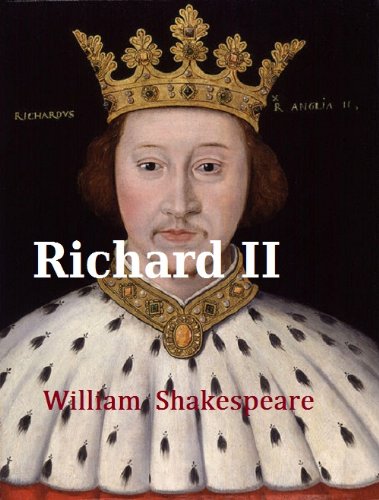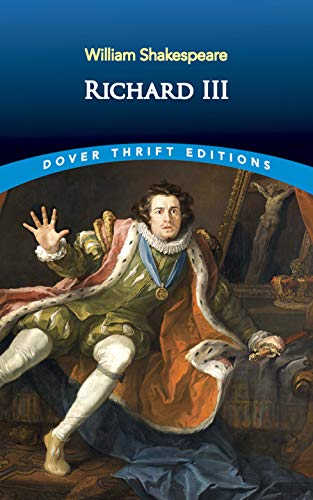-
Richard II:
William Shakespeare
eBook (, Nov. 9, 2018)Annotated with am introduction image.King Richard the Second is a history play by William Shakespeare believed to be written in approximately 1595. It is based on the life of King Richard II of England and is the first part of a tetralogy, referred to by scholars as the Henriad, followed by three plays concerning Richard's successors: Henry IV, part 1, Henry IV, part 2, and Henry V. It may not have been written as a stand-alone work.
-
Richard II
William Shakespeare
eBook (, Feb. 9, 2019)King Richard the Second is a history play by William Shakespeare believed to have been written in approximately 1595. It is based on the life of King Richard II of England (ruled 1377–1399) and is the first part of a tetralogy, referred to by some scholars as the Henriad, followed by three plays concerning Richard's successors: Henry IV, Part 1; Henry IV, Part 2; and Henry V.Although the First Folio (1623) edition of Shakespeare's works lists the play as a history play, the earlier Quarto edition of 1597 calls it The tragedie of King Richard the second.Shakespeare's primary source for Richard II, as for most of his chronicle histories, was Raphael Holinshed's Chronicles; the publication of the second edition in 1587 provides a terminus post quem for the play. Edward Hall's The Union of the Two Illustrious Families of Lancaster and York appears also to have been consulted, and scholars have also supposed Shakespeare familiar with Samuel Daniel's poem on the civil wars.
-
Richard II
William Shakespeare
eBook (, Sept. 16, 2019)King Richard the Second is a history play by William Shakespeare believed to be written in approximately 1595. It is based on the life of King Richard II of England and is the first part of a tetralogy, referred to by scholars as the Henriad, followed by three plays concerning Richard's successors: Henry IV, part 1, Henry IV, part 2, and Henry V. It may not have been written as a stand-alone work. William Shakespeare (bapt. 26 April 1564 – 23 April 1616) was an English poet, playwright, and actor, widely regarded as the greatest writer in the English language and the world's greatest dramatist. He is often called England's national poet and the "Bard of Avon". His extant works, including collaborations, consist of some 39 plays, 154 sonnets, two long narrative poems, and a few other verses, some of uncertain authorship. His plays have been translated into every major living language and are performed more often than those of any other playwright.Shakespeare was born and raised in Stratford-upon-Avon, Warwickshire. At the age of 18, he married Anne Hathaway, with whom he had three children: Susanna and twins Hamnet and Judith. Sometime between 1585 and 1592, he began a successful career in London as an actor, writer, and part-owner of a playing company called the Lord Chamberlain's Men, later known as the King's Men. At age 49 (around 1613), he appears to have retired to Stratford, where he died three years later. Few records of Shakespeare's private life survive; this has stimulated considerable speculation about such matters as his physical appearance, his sexuality, his religious beliefs, and whether the works attributed to him were written by others. Such theories are often criticised for failing to adequately note that few records survive of most commoners of the period.
-
Richard II
William Shakespeare
eBook (WS, June 13, 2018)King Richard the Second is a history play by William Shakespeare believed to be written in approximately 1595. It is based on the life of King Richard II of England and is the first part of a tetralogy, referred to by scholars as the Henriad, followed by three plays concerning Richard's successors: Henry IV, part 1, Henry IV, part 2, and Henry V. It may not have been written as a stand-alone work.
-
Richard II
William Shakespeare
eBook (, Jan. 29, 2011)King Richard the Second is a history play by William Shakespeare believed to be written in approximately 1595. It is based on the life of King Richard II of England (ruled 1377–1399) and is the first part of a tetralogy, referred to by some scholars as the Henriad, followed by three plays concerning Richard's successors: Henry IV, part 1, Henry IV, part 2, and Henry V. It may not have been written as a stand-alone work.Although the First Folio (1623) edition of Shakespeare's works lists the play as a history play, the earlier Quarto edition of 1597 calls itself The tragedie of King Richard the second.Per Wikipedia
-
Richard II
William Shakespeare
eBook (, Jan. 29, 2011)King Richard the Second is a history play by William Shakespeare believed to be written in approximately 1595. It is based on the life of King Richard II of England (ruled 1377–1399) and is the first part of a tetralogy, referred to by some scholars as the Henriad, followed by three plays concerning Richard's successors: Henry IV, part 1, Henry IV, part 2, and Henry V. It may not have been written as a stand-alone work.Although the First Folio (1623) edition of Shakespeare's works lists the play as a history play, the earlier Quarto edition of 1597 calls itself The tragedie of King Richard the second.Per Wikipedia
-
Richard II
William Shakespeare
eBook (Page2Page, July 19, 2019)King Richard the Second is a history play by William Shakespeare believed to be written in approximately 1595. It is based on the life of King Richard II of England and is the first part of a tetralogy, referred to by scholars as the Henriad, followed by three plays concerning Richard's successors: Henry IV, part 1, Henry IV, part 2, and Henry V. It may not have been written as a stand-alone work.
-
Richard III
William Shakespeare
language (Dover Publications, April 18, 2012)The final play in Shakespeare's masterly dramatization of the strife between the Houses of York and Lancaster, Richard III offers a stunning portrait of an archvillain--a man of cunning and ruthless ambition who seduces, betrays and murders his way to the throne. In the process, Richard delivers great speeches and engages in formidable confrontations with a large cast of characters, almost all of them caught up in the terrible struggle for power that dominates the play. It is a tribute to Shakespeare's dramatic genius and knowledge of human psychology that by the end of the drama the detestable Richard begins to elicit some sympathy for the awful plight in which he finds himself. Explanatory footnotes and an introductory note are included.
-
Richard III
William Shakespeare, E. A. J. Honigmann, Michael Taylor, Gillian Day
eBook (Penguin, April 7, 2005)'Now is the winter of our discontent Made glorious summer by this sun of York'Shakespeare's final drama of the Wars of the Roses cycle begins as the dust settles on England after bloody civil war, and the bitter hunchback Richard, brother of the king, secretly plots to seize the throne. Charming and duplicitous, powerfully eloquent and viciously cruel, he is prepared to go to any lengths to achieve his goal. Richard III shows a man who, in his skilful manipulation of events and people, is a chilling incarnation of the temptations of power in a land shocked by war.Used and Recommended by the National TheatreGeneral Editor Stanley WellsEdited by E. A. J. HonigmannIntroduction by Michael Taylor
-
Richard II
William Shakespeare, Frances E. Dolan
eBook (Penguin Classics, March 7, 2017)The acclaimed Pelican Shakespeare series, now in a dazzling new series design The Pelican Shakespeare series features authoritative and meticulously researched texts paired with scholarship by renowned Shakespeareans. Each book includes an essay on the theatrical world of Shakespeare’s time, an introduction to the individual play, and a detailed note on the text used. Updated by general editors Stephen Orgel and A. R. Braunmuller, these easy-to-read editions incorporate over thirty years of Shakespeare scholarship undertaken since the original series, edited by Alfred Harbage, appeared between 1956 and 1967. With stunning new covers designed by Manuja Waldia, definitive texts, and illuminating essays, the Pelican Shakespeare will remain a valued resource for students, teachers, and theater professionals for many years to come.This edition of Richard II is edited with an introduction by Francis E. Dolan.For more than seventy years, Penguin has been the leading publisher of classic literature in the English-speaking world. With more than 1,700 titles, Penguin Classics represents a global bookshelf of the best works throughout history and across genres and disciplines. Readers trust the series to provide authoritative texts enhanced by introductions and notes by distinguished scholars and contemporary authors, as well as up-to-date translations by award-winning translators.
-
Richard III
William Shakespeare
Paperback (Dover Publications, Oct. 24, 1995)The final play in Shakespeare's masterly dramatization of the strife between the Houses of York and Lancaster, Richard III offers a stunning portrait of an archvillain — a man of cunning and ruthless ambition who seduces, betrays and murders his way to the throne. In the process, Richard delivers great speeches and engages in formidable confrontations with a large cast of characters, almost all of them caught up in the terrible struggle for power that dominates the play. It is a tribute to Shakespeare's dramatic genius and knowledge of human psychology that by the end of the drama the detestable Richard begins to elicit some sympathy for the awful plight in which he finds himself. Explanatory footnotes and an introductory note are included. Z
Z
-
Richard II
William Shakespeare, Charles Harold Herford
eBook (Digireads.com Publishing, June 1, 2018)The first play in William Shakespeare’s tetralogy of plays which also includes “Henry IV, Part 1”, “Henry IV, Part 2”, and “Henry V”, “Richard II” is believed to have been written around 1595. A history play, the drama concerns the last two years of the life of King Richard II of England, spanning the years 1398 to 1400. The drama begins with a dispute between Richard’s cousin, Henry Bolingbroke, who would later become King Henry IV, and Thomas de Mowbray, first Duke of Norfolk. Henry has accused Mowbray of murdering his uncle, the Duke of Gloucester. Meanwhile, Henry’s father, John of Gaunt, first Duke of Lancaster, believes it is Richard that is responsible for his brother’s murder. Unable to resolve the matter by traditional methods it is agreed that the dispute will be settled through trial by battle between Bolingbroke and Mowbray. What ensues is a series of events that will bring about the tragic downfall of Richard. A study in the disastrous consequences of political miscalculation, “Richard II” begins the story of a dramatically Machiavellian period of England’s rule. This edition includes a preface and annotations by Henry N. Hudson, an introduction by Charles Harold Herford, and a biographical afterword. Z
Z